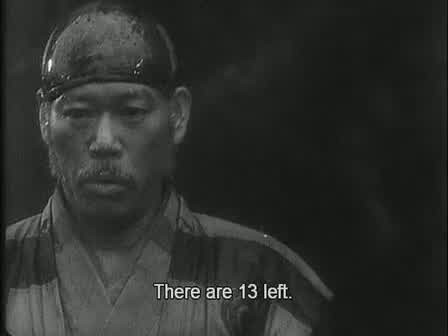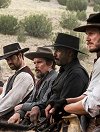Regie:
黒澤明Kamera:
Asakazu NakaiMusik:
Fumio HayasakaBesetzung:
Takashi Shimura, Daisuke Katō, Minoru Chiaki, Isao Kimura, Seiji Miyaguchi, Toshirō Mifune, Kamatari Fujiwara, Atsushi Watanabe, Isao Yamagata (mehr)Inhalte(1)
Japan, im 16. Jahrhundert: Ein Bauerndorf will sich gegen plündernde Banden zur Wehr setzen. Die Bewohner engagieren sieben Samurai als Schutztruppe, um ihr Hab und Gut zu verteidigen. Japan, im 16. Jahrhundert: Ein kleines Dorf wird alljährlich nach der Ernte von einer Truppe Banditen seiner Lebensgrundlage beraubt. Doch diesmal wollen sich die Bauern wehren: Da es ihnen an Waffen sowie an kriegerischer Stärke und Taktik mangelt, beschließen sie, Samurai zur Verteidigung ihrer Siedlung zu engagieren. Die sieben angeheuerten Samurai haben unterschiedliche Antriebsgründe: Anführer Kambei möchte auf seine alten Tage noch einmal für die gute Sache kämpfen. Gorobei, Shichiroji und Heihachi unterstützen ihn aus freundschaftlicher Verbundenheit. Der junge, unerfahrene Katsushiro schließt sich Kambei an, um die hohe Kunst der Samurai zu erlernen, und der verschwiegene Kyuzo möchte pflichtbewusst seiner Bestimmung nachgehen. Der letzte im Bunde ist der verrückte und extrovertierte Kikuchiyo, der vor allem durch Prahlerei auffällt. Nach der Ernte tauchen drei Kundschafter der Banditen auf. Die Samurai folgen ihnen in ihr Versteck und zünden ihr Lager an, woraufhin einer ihrer Männer im Gefecht sein Leben lassen muss. Nach der Rückkehr ins Dorf herrscht allgemeine Niedergeschlagenheit. In diesem Moment greifen die Banditen überraschend an. Doch zusammen mit den Dörflern gelingt es den Samurai, die Siedlung zu verteidigen. Nach einem harten Kampf ist der Feind geschlagen und die Ernte sicher. Doch dafür gaben vier der sieben Samurai ihr Leben. Während die Bauern schon wieder fröhlich neuen Reis anbauen, muss Kambei enttäuscht feststellen, dass es für die Samurai angesichts ihrer toten Kameraden eine verlorene Schlacht war. (arte)
(mehr)Kritiken (9)
Stretching a simple story about samurai protecting a poor farming village to three and a half hours, without any escalation or tension, and almost boring me out of my skull, is not a sign of genius. There, I said it, Kurosawa.
()
Die sieben Samurai und Die Glorreichen Sieben zeigen deutlich den Unterschied in der Art der Herangehensweise der japanischen und amerikanischen Kinematografie auf. Dort, wo sich eine durch aufgemotzter Gesten, ach so starkes Gerede oder heroische Archetypen auszeichnet, baut die andere auf einem allmählich aufbauendem Tempo, der Freude am Geschichtenerzählen, auf angedeutungsweise aufgezeigten Charakteren sowie einer Botschaft des Krieges auf. Ja sogar das Ende der Sieben Samurai (jenes legendäre "Wir waren nicht derjenigen, die gewonnen haben") klingt vollends ohne Pathos aus und thematisiert eher die Tragik der Männer, die nicht aufhören können zu Krieg zu führen, weil er ihr Lebensunterhalt ist. Kurosawas Film mag für das Action-Genre vielleicht zu feinschmeckerisch lässig zu sein, durchtränkt mit wunderschönen Dialogen und großartigen "Abschweifern", jedoch gerade das macht ihn hundertmal wertvoller als Sturges späteres Remake. Es ist nicht nur eine Geschichte des wenigen gegen vieles, sondern die Geschichte eines echten Krieges (denn so benennen ja die Samurai selbst die Verteidigung des Dorfes), wo es überraschenderweise am unausweichlichen Gefühl fehlt, "sie werden sie niedermähen". Immerhin stehen in der letzten Szene 13 Verbrecher einem gesamten Dorf voller entschlossener Verteidiger gegenüber! Es fehlt ja auch an einem klassischen Baddie! Jedoch gerade das Fehlen vom üblichen Schema Gut x Böse (die Samurai sind sicherlich keine Heiligen) sowie der Ersatz dessen mit glaubwürdigen Charakteren, angeführt vom unglaublich irren Toshirô Mifun, verleiht dem Film eine wunderschöne Poesie, von der die amerikanische Bablgam-Version ja nur träumen kann. Jedenfalls ist dies einer der besten Kriegsfilme, die je gedreht worden sind. Weise, umsichtig, tiefgründig. [Die glorreichen Sieben mag ich wirklich, aber ...]
()
Seven stars for seven samurais. Oh, I can’t give that many, can I... So at least five of them. The still unsurpassed original which, unlike its more famous remake, loses only in not having a “star" amongst the baddies. Like Calvera in The Magnificent Seven. The western version also wins in terms of pace. In all other aspects, the Kurosawa version is better and since everybody is aware of the qualities of the American remake, I don’t have to sing the Samurais’ praises any further. Along with Red Beard and High and Low, this is Kurosawa’s best piece.
()
The story does not differ from the more well-known American western classic, perhaps only in that Kurosawa gives more space to the villagers and the viewer can sympathize with them more, whereas in The Magnificent Seven, I was more concerned with how many cowboys would survive than with the farmers. I don't like looking for flaws in classics, but three hours for a story about saving a village from bandits is a bit too much, and especially in the middle third, I found myself glancing at the clock too often. This time, Asian grandiosity did not resonate with me.
()
Even though I'd been interested in Kikuchiya for a long time, even though it entertained me and made me laugh, it was too long... Yes, it's a legendary film that a lot of directors have taken their cue from. It's typically Japanese, those who don't know a bit of the Japanese mentality may be surprised by many things (the film remains misunderstood in many aspects); it flows slowly, it flows gradually, it flows with the seasons. And apparently it's a must for anyone who wants to get to know Kurasawa-sama a little :-) But let's not kid ourselves, the running time is just overlong... :-D
()
Seven Samurai is considered one of the cornerstones of the action and adventure genre. It is a film that is usually discussed in superlatives and is exceptionally highly rated by film fans. So please explain to me why I felt as if I had worked a full day in a quarry after watching it, even though I watched it with a break and only saw the edited 160-minute version. The original has an additional runtime of 43 minutes. Film critics generally consider Kurosawa's peak creative period to be in the 1950s, but I, on the other hand, believe that while Kurosawa's work in the 1950s was daring, ambitious, and clearly superior in quality to the gray Japanese contemporary production, he was still striving for directorial mastery. His samurai excursions into ancient history suffer from a theatrical acting style that often crosses over into unpleasant affectation. In this regard, Toshiro Mifune's portrayal of Kikuchiyo is sometimes unbearable. It is strange that this characteristic of Kurosawa's historical films is almost unnoticed by others. In comparison to the more famous American remake The Magnificent Seven, Akira ultimately achieved a draw in my eyes, even though both films have their strengths and weaknesses in different areas. The original film has a realistic tone, with the mercenaries not triumphing over a nearly sixfold numerical advantage due to exceptional fighting skills, but rather by joining forces with the village residents, training them in defense of their homes, and teaching them tactics and weapon control. In contrast, the American version is faster-paced and more entertaining, with a reasonable runtime and better-developed characters, but it is steeped in genre clichés and is a typical western fairy tale about invincible gunmen defeating villains. Overall impression: 60%.
()
Kurosawa’s gem is a tad slow for my taste, but precise in every detail. This picture was a foundation stone for so many stories, where a handful of brave men stand up for the weak, even though they are heavily outnumbered. These days we should value these films all the more, because even after all these years they tell us more about people than any others. Your head is on the block and all you think of are your whiskers?
()
The Japanese can be rightly proud of themselves, because already in 1954 they came up with such a breathtaking adventure spectacle, the likes of which had never been seen in Hollywood not only until then, but even a few years later. Much has already been said about The Magnificent Seven, which borrowed the theme and, according to many, even surpassed it, but I wouldn't go into any comparisons. Seven Samurai is, after all, a very different film, one that irradiates Japanese culture, and one that fleshes out the story in a far more detailed, emotional and realistic way than its American counterpart. The Samurai were no cowboys who would not bat an eyelash at a hostile attack, but a bunch of ordinary cheerful people with admirable endurance and courage. And maybe that’s the reason I liked the Japanese film a bit more, not only does it present the heroism and determination of the protagonists, but it also focuses on their character and their initially difficult coexistence with the oppressed population. 207 minutes may look exhausting, but believe me, there's probably no better way to spend them than watching Seven Magnificent Samurai under the guidance of Master Kurosawa...
()
One of those movies that are not unnecessarily celebrated. It is a breathtaking opus that is indeed long, but not unnecessarily. There is drama, there is humor, action, and emotions. All of this in the story of a village that just wanted to help against the bandits. Great characters and great scenes that cannot be easily forgotten. Above all, the ending is truly harrowing and shows the form that gratitude can take towards people who died for you.
()



